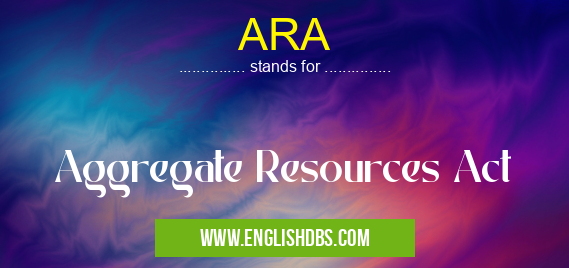What does ARA mean in ENVIRONMENTAL
The Aggregate Resources Act (ARA) is a Canadian law that was introduced in 1980 to protect the rights of citizens and landowners living close to pits and quarries who mine aggregate, such as sand, gravel, crushed stone and clay. The ARA also sets out rules for the management of these natural resources. It requires operators to obtain approval from the Ministry of Natural Resources and Forestry before they can begin operations, and requires them to restore land disturbed by their activities.

ARA meaning in Environmental in Governmental
ARA mostly used in an acronym Environmental in Category Governmental that means Aggregate Resources Act
Shorthand: ARA,
Full Form: Aggregate Resources Act
For more information of "Aggregate Resources Act", see the section below.
Purpose of ARA
The purpose of the ARA is to ensure that pits and quarries are operated safely and securely while also protecting the environment surrounding them. The Act requires operators to submit an operational plan to MNRF prior to commencing mining operations, which must outline how they will manage environmental impacts. It also sets out rules on noise control, dust control, water conservation measures, rehabilitation plans for disturbed areas, wildlife habitat protection efforts, financial assurance plans requiring operators to set aside funds for potential cleanup costs or damage payments and other related provisions determining safe operation standards at these sites.
Essential Questions and Answers on Aggregate Resources Act in "GOVERNMENTAL»ENVIRONMENTAL"
What is the Aggregate Resources Act?
The Aggregate Resources Act (ARA) is a provincial act that ensures aggregate resources such as sand, gravel, and rock are managed in a sustainable manner. It provides direction to municipalities, companies, and individuals on how to safely extract and use aggregate resources throughout Ontario.
Does the ARA regulate aggregate extraction?
Yes, the ARA puts requirements in place for regulating aggregate extraction including safety standards, environmental protection measures, public consultation processes, and licensing procedures.
Who enforces compliance with the ARA?
The Ministry of Natural Resources and Forestry (MNRF) has responsibility for enforcing the ARA. Any company or individual found to be in breach of the requirements under this act may face legal action from MNRF or other agencies.
What is an aggregate resource?
An aggregate resource is any mineral material used for construction purposes such as sand, gravel or rock. These materials are primarily sourced from pits and quarries.
What are some of the restrictions under the ARA?
Restrictions under the ARA include limits on noise levels during extraction operations; buffer zones between extraction sites and surface water; rehabilitation plans for post-extraction sites; dust control measures; compliance with air quality guidelines; minimal disturbance of vegetation; public consultation process prior to any application for licence; and compensation for affected landowners where appropriate.
Is an Environmental Assessment required before obtaining a licence under the ARA?
Depending on the size and scope of your project, you may need to conduct an Environmental Assessment to obtain a licence under the ARA. This assessment will evaluate potential impacts of your proposed activities on human health and other aspects of the environment such as soil quality or wildlife habitat.
Where can I find out more about my obligations under this Act?
The MNRF website has comprehensive information about all aspects related to regulatory requirements under this Act including licensing procedures, safety requirements, environmental protection measures etc., You may also contact your local MNRF office if you have more specific questions about compliance with this Act.
Can I appeal if my application is denied by MNRF?
Yes, you may appeal your application denial by requesting an internal review through MNRF’s appeals process which begins by submitting a written request within 30 days of receiving notice that your application was denied. Additionally you can seek judicial review from Divisional Court if you still disagree with MNRF’s decision after completing their internal appeals process.
Are there financial penalties for non-compliance with ARA requirements?
Yes, failure to comply with administrative orders or any conditions imposed as part of an agreement with MNRF can result in fines up to $25 million per day as well as additional criminal charges depending on severity of offence. Companies are also liable for clean-up costs associated with spillage/ pollution caused by non-compliance with provisions outlined in this Act.
Final Words:
In conclusion, the Aggregate Resources Act is an important piece of legislation in Canada that sets out rules regarding how pits and quarries must be operated in order to protect our environment as well as those who live nearby these sites. The ARA allows us all to enjoy the benefits of aggregate extraction while ensuring safety measures are taken into consideration throughout its life cycle from start up through shut down activities.
ARA also stands for: |
|
| All stands for ARA |
